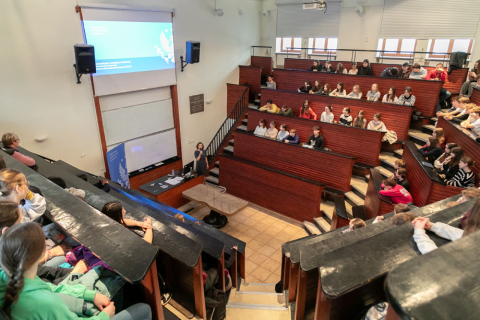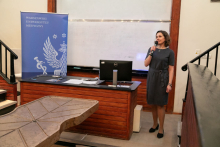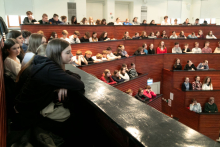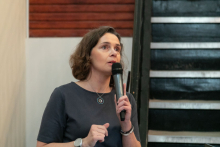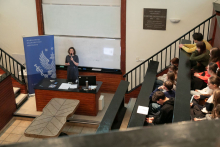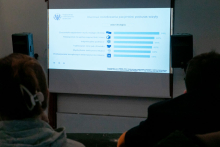- Medicine is one of the most humanistic sciences among the natural and exact sciences - the speaker emphasized at the beginning/outset - and today we are going to talk about the human being and what is most important to that person.
What is this? It's the expectation of patients that medical personnel notice them in their entire perspective, rather than focusing only on one organ or test result. This thought was the pretext for further consideration of the role played by proper communication in modern medicine.
The case of Amelia, an imagined patient
Third-year students meet Amelia during a communications classes. She ends up in the hospital with left-sided lobar pneumonia; an X-ray taken showed no abnormal changes. She is treated with antibiotics, stays a few days in the hospital, then goes home. A follow-up examination scheduled for six weeks from now, the patient does after three months. At that time it turns out that she has a large lesion in her left lung. The students' task is to tell the patient that she has a very serious disease and cannot be cured, operated on, given chemotherapy or radiation therapy. The only thing left is palliative care.
- In such a situation, being with the patient and conversation is something of utmost importance - Dr. Doroszewska explained. And she emphasized: - This is a huge responsibility and burden for the doctor, which is why it is so important to teach proper communication. So that he doesn't feel completely helpless in such a situation, but also that this extremely difficult conversation, from the point of view of content, is a good conversation for the patient. So that the patient feels that someone is there for her, thinks about her, cares about her, that she is not alone in this situation.
Patients' expectations of medical personnel
According to several studies cited by Dr. Doroszewska, patients count first and foremost on the staff dealing with them being knowledgeable and able to make a good diagnosis. But equally important to them are an understandable way of conveying information about their condition, devoting enough time to them, and allowing them to feel that they are being treated individually.
- A patient who doesn't have a medical background can't judge whether you're making theses based on the latest scientific findings, can't be sure whether you've chosen the best treatment method from their perspective. But they know how they will feel during their visit - the speaker said.
She also referred to a survey aimed at analyzing patients' opinions on the qualities with which they link the word “professionalism” among medical professionals. These were primarily empathy, commitment, understanding, approachability, calmness, and patience. A professional medic was thus described from the perspective of qualities and abilities to establish contact with patients.
Why is it important to learn how to communicate?
First, because medical personnel with skills in communicating with patients will learn more from the patient about his illness. If the patient knows that the doctor accepts him, questions him, listens to him, he will tell about all situations in his daily life that may affect his condition, and thus the doctor has a chance to make a good diagnosis faster.
The second argument Dr. Doroszewska gave was better patient compliance. - A doctor who communicates well inspires patient trust, and one who inspires our trust is listened to by us more willingly and more often. And this translates into better treatment results - the speaker said, and assured that this is a source of additional satisfaction for the doctor. She also stressed that good communication influences the level of burnout among medical personnel - or, more precisely, reduces it, because there are fewer situations in which one does not know what to do, and in which one does not understand the patient.
Is it difficult to learn how to communicate?
Some people make the assumption that it cannot be taught. But research results cited by the speaker showed that certain skills conducive to good communication with patients, such as empathy, are teachable and can also be developed. - Just because I don't know how to do it today: talk to another person, doesn't mean that I can't learn it, become skilled at it and then do it well - Dr. Doroszewska assured.
Why and how do we do it at the Department of Medical Communication MUW?
- We teach how to communicate so that you can walk the road with the patient along a well-trodden path that you know how it runs and where it leads - the speaker said at the end.
She stressed that just as a surgeon uses certain tools for his or her work, in communication one has a number of tools to come to an understanding with a patient. As soon as students acquire this knowledge, they hold classes with simulated patients. The simulations allow - under safe conditions – students to test themselves, to see if they know how to talk and how they feel. These are conversations that are often very difficult, simulated patients show real emotions, share their experiences, recreate different ideas about life and beliefs. And although the situations are pretended, because they are simulated, the emotions are very real.
The lecture ended with a discussion with students. The meeting was attended by Klementyna Hoffmanowa High School No. X, Władysław IV High School No. VIII, Stefan Batory High School No. II with Bilingual Branches, Tadeusz Czacki High School No. XXVII, Stefan Żeromski High School No. XL with Bilingual Branches.
